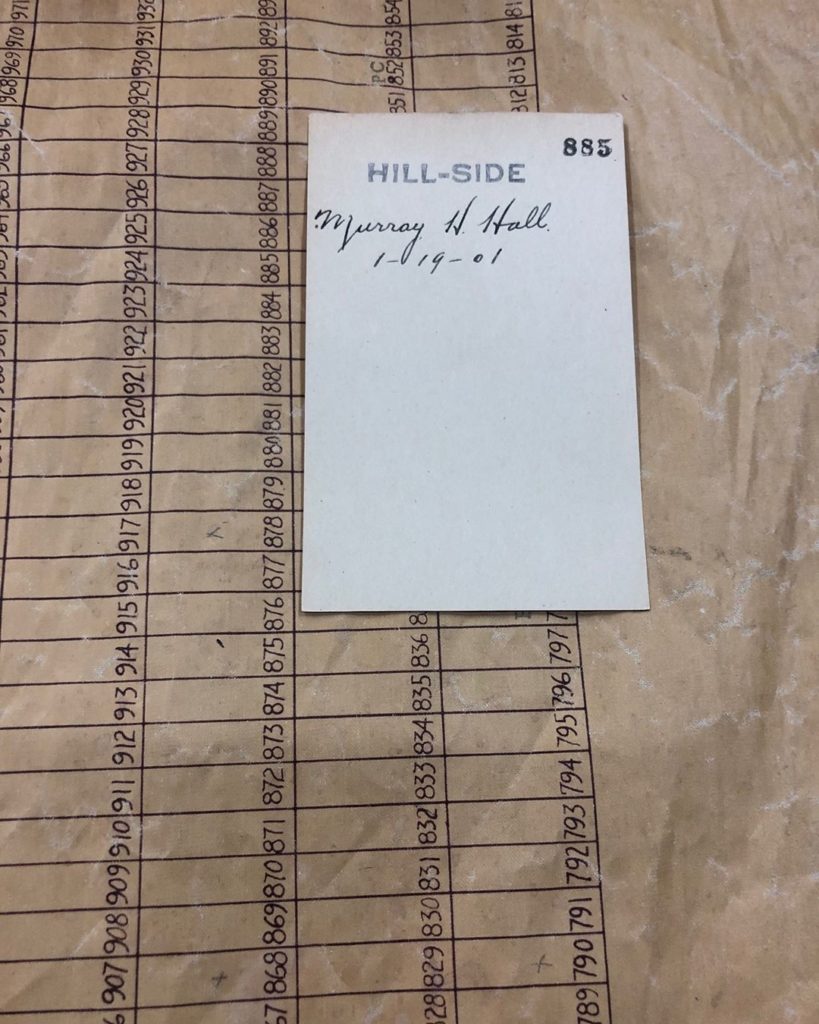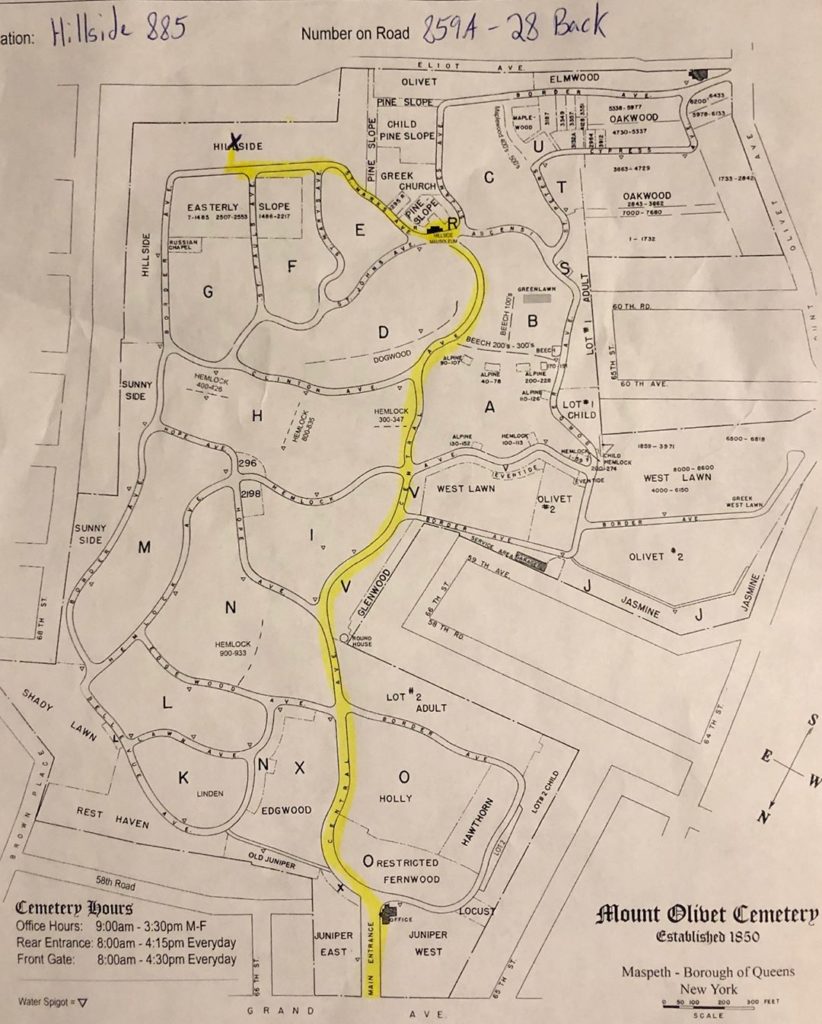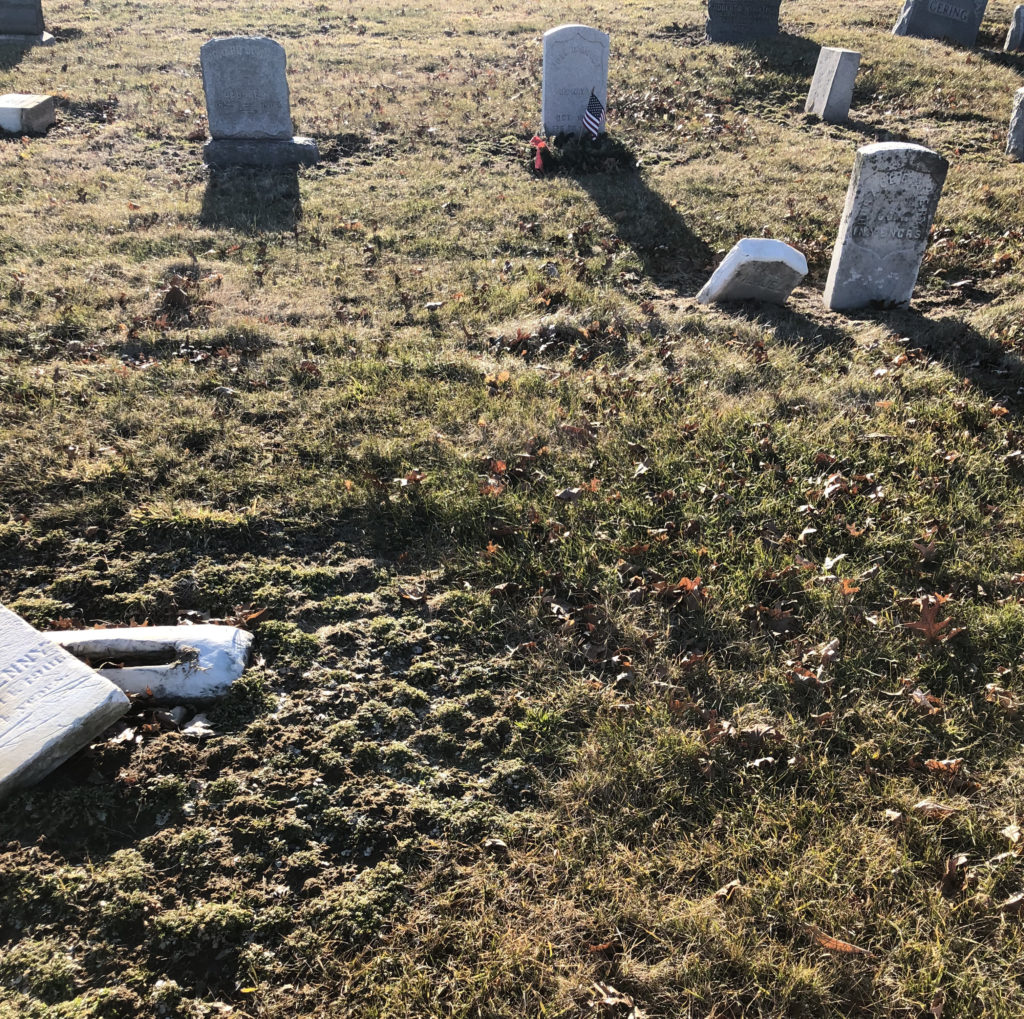Month: February 2019
Visiting the (Unmarked) Grave of Murray Hall
February 4, 2019
Recently, Project co-director Ken Lustbader visited the grave site of Murray Hall, a gender non-conforming Tammany Hall politico whose Greenwich Village residence, at 457 Sixth Avenue, we’ve mapped as an NYC LGBT historic site. Here’s Ken’s story about his visit:
“I live near the apartment where Murray Hall resided in the Village, so his story is present in my daily life. I felt it was important to honor Hall’s memory by visiting his grave and made a visit to Mount Olivet Cemetery in Maspeth, Queens. Hall was buried on January 19th, 1901, three days after he died. I wasn’t sure what I’d find since, most likely, no one had been there in years or even decades. Unfortunately, Hall’s grave is unmarked, which is what you see here. I found the grave site after cemetery staff shared Hall’s ledger card with me (pictured), which included his name and grave location. It’s rather sad that there’s no tombstone to commemorate his life, but the visit was still incredibly meaningful and poignant for me. I may have been the first visitor in a very long time. Now, when I walk by Hall’s residence, I feel a bit more connected to him, knowing that I paid a visit to his grave.”



Photos by Ken Lustbader.
Threat to Club Langston Underscores Risks to LGBT-Dedicated Venues in Brooklyn
February 28, 2019
FOR IMMEDIATE RELEASE
PRESS CONTACT
Ken Lustbader, NYC LGBT Historic Sites Project
p: (917) 848-1776 / e: [email protected]
NYC LGBT Historic Sites Project
on the historic, black-owned Starlite Lounge
Call to revisit history upon news of at-risk Club Langston, also in Brooklyn
New York, NY—Thursday, February 28, 2019—It was reported this month that Club Langston, the self-described “last LGBTQIA+ black club in New York City,” is threatened with permanent closure by a combination of rent increases, taxes, business-code violation fees and other expenses.1
The NYC LGBT Historic Sites Project, the only scholarly initiative and educational resource dedicated to recording the place-based history of the LGBT movement in New York City, recalls Club Langston’s predecessor, the Starlite Lounge, which closed nearly ten years ago. Celebrated as the “oldest black-owned non-discriminating bar in New York,” Brooklyn’s Starlite Lounge closed in 2010 and is documented by the Project as an LGBT historic site (more below).
“While their significance is often underestimated or dismissed by heterosexual society,” said Ken Lustbader, co-director of the NYC LGBT Historic Sites Project, “bars and other establishments play a pivotal role is LGBT culture and have throughout the 20th century as centers for LGBT acceptance, community and activism.” Through history, these spaces — whether always gay friendly or only during certain times of the day or week — have given LGBT people the freedom to be themselves in a way they often cannot be in their personal or professional lives.
Club Langston (formally called the Moore Bar and Lounge) is affectionately nicknamed by its patrons after Langston Hughes, the celebrated poet and a leading figure of the Harlem Renaissance. Though private about his personal life, Hughes is generally believed to have been gay and included homosexual subtext in his writing. His former residence at 20 East 127th Street is included on the Project website as an LGBT historic site and was designated an Individual Landmark by the NYC Landmarks Preservation Commission in 1981. The residence was also listed on the New York State and National Registers of Historic Places in 1982.
About the Starlite Lounge (closed 2010)Formerly located in the building at the corner of Bergen Street and Nostrand Avenue in Crown Heights, the Starlite Lounge was established by openly gay African-American entrepreneur Harold “Mackie” Harris as an LGBT-inclusive bar in 1962. Starlite was possibly the first black-owned gay bar in Brooklyn, catering to LGBT people of color at a time when the Mafia operated most LGBT bars in New York. Harris lived in the neighborhood and created what became a legendary safe-haven in central Brooklyn that catered to a diverse clientele, LGBT and straight, depending on the hour of the day and day of the week.
Between 1992 and 2004, the bar was owned by William “Butch” King, who was the resident DJ and helped establish Starlite as a destination for house music and dancing. By the end of its 50-plus-year run, the self-described “oldest black-owned non-discriminating bar in New York” catered to LGBT people of color and a broader clientele throughout the week and especially at Friday night drag shows and Saturday night house music events. It was considered one of Brooklyn’s oldest gay bars when it was forced to close on July 31, 2010 after being evicted due to the sale of the building.
Photo: Starlite Lounge, c. 1980s. Courtesy of the NYC Municipal Archives.
1 As reported by NBC in “Business owner fights to save ‘last LGBTQIA+ black club in NYC'” (more)
About the NYC LGBT Historic Sites Project
The NYC LGBT Historic Sites Project is a cultural initiative and educational resource that is documenting historic sites connected to the LGBT community throughout New York City. Its interactive map features diverse places from the 17th century to the year 2000 that are important to LGBT history and illustrate the community’s influence on American culture. The Project is nominating sites to the National Register of Historic Places and developing educational tours and programs.
###
“Queer Quiz Show” with Making Gay History at New York Public Library
February 15, 2019 | 7:00pm-10:00pm
New York Public Library (NYPL)
Stephen A. Schwarzman, Fifth Avenue at 42nd Street
View on Google Maps
 On Friday, February 14th, we’ll be joining the Making Gay History podcast at the New York Public Library for “Queer Quiz Show,” an LGBTQ history trivia program.
On Friday, February 14th, we’ll be joining the Making Gay History podcast at the New York Public Library for “Queer Quiz Show,” an LGBTQ history trivia program.
See below for full details on the event, or click here for full information and tickets.
The Library After Hours: Love & Resistance
Join us at the Stephen A. Schwarzman Building for the city’s most cerebral happy hour.
Celebrate the opening of the Library’s newest exhibition Love & Resistance: Stonewall 50 with a night of curator talks, trivia, special guests, and more as we explore the history of LGBTQ civil rights following the 1969 Stonewall Riots.
Love & Resistance will include:
- After hours access to the Library’s new exhibition Love & Resistance: Stonewall 50, featuring photographs, documents, ephemera and more that illustrate the themes of nightlife, love, activism, and the queer press.
- Copies of the exhibition’s accompanying book Love and Resistance: Out of the Closet Into the Stonewall Era—which includes photographs taken by Kay Tobin Lahusen and Diana Davies, with a foreword by Roxane Gay—will be on sale before its March 2019 publication date.
- Curator talks featuring exhibition curator Jason Baumann, the Library’s Susan and Douglas Dillon Assistant Director for Collection Development and Coordinator of Humanities and LGBT Collections
- Trivia with Making Gay History podcast host Eric Marcus
- Drag Queen Story Hour’s very first story time for adults
- Listening stations from the NYC Trans Oral History Project—a community archive devoted to the collection, preservation and sharing of trans histories, organized in collaboration with The New York Public Library
- Games, puzzles, and crafting highlighting the Library’s vast LGBTQ archive
- Music and beats by New York based multidisciplinary artist and DJ, SHYBOI
- Food & drinks available for purchase
- After hours access to beautiful NYPL spaces including the Rose Main Reading Room
21+ | ID required | #NYPLafterhours